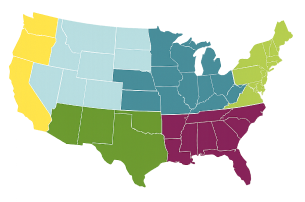Peonies – Timeless Blooms That Return for a Lifetime
Peonies are perennial legends—beloved for their billowy blooms, captivating fragrance, and lush green foliage. With petals piled high in hues of blush, crimson, snow-white, and even golden yellow, these spring-blooming beauties bring graceful charm to garden beds and bouquets alike. Remarkably long-lived and low-maintenance once established, they return reliably each year and are naturally rabbit and deer resistant perennials—making them as tough as they are enchanting.
Why Plant Peonies?
Peonies are the garden’s version of effortless elegance—producing show-stopping, oversized flowers that sway atop a sea of glossy green leaves. These enduring perennials can flourish for generations, often living for over 100 years with little more than sun, soil, and admiration. Their sturdy stems and rich fragrance make them darlings of the cut flower world, and with varieties ranging from ruffled doubles to heirloom favorites like Festiva Maxima, there’s a peony to suit every gardener’s dreams. Whether showcased in floral arrangements or massed for waves of color and scent, peonies are always up for a starring role. For pure white petals brushed with crimson, bold blooms, and a fragrance that drifts on the breeze, Festiva Maxima is a shining example of why peonies have captured gardeners’ hearts for centuries.
American Meadows Favorites
At American Meadows, we’ve gathered a collection of Peony plants for sale that combine time-tested reliability with irresistible beauty. ‘Sarah Bernhardt’ Peony is a garden classic, flaunting fluffy pastel pink petals, a sugary-sweet scent, and lush foliage that shines in borders or bouquets. It’s a favorite for good reason—cold-hardy, consistently blooming, and effortlessly romantic. ‘Festiva Maxima’ Peony brings old-world elegance to the garden with frothy white petals flecked in crimson and a fragrance that lingers on the breeze. Blooming early in the season, this heirloom beauty has been turning heads for over 150 years—and it's not slowing down. ‘Shirley Temple’ makes a dreamy entrance with double blooms that open blush and fade to creamy white. This mid-season bloomer is every bit as charming as its namesake, offering poise, perfume, and petal-packed performance.
How to Plant Peonies
To set your Peonies up for a lifetime of splendor, plant them in full sun and well-drained soil. Dig deep and enrich the site with compost or leaf mold for a nourishing start. When planting bareroots, look for the pink “eyes” and set them facing skyward. In colder zones, cover eyes with 1–2 inches of soil; in warmer climates, plant them shallower. Allow generous spacing—about three feet per plant—to let them shine. Plant Peonies in early fall, a month before the ground freezes, or in early spring, and water regularly through the first growing season. Once established, they’re the definition of low-maintenance luxury.
How to Grow Peonies Throughout the Season
Peonies reach an elegant 36 inches high and 30 inches wide, forming statuesque mounds of blooms and greenery. Support heavy blossoms with Peony rings or a simple stake-and-twine grid to keep them upright and show-ready. Once established, water deeply but only when needed, and feed with an organic fertilizer in early spring. Deadhead blooms to encourage vigor, and prune any blackened stems to sidestep fungus. Avoid overhead watering and soggy soil to keep blight at bay. In late fall, tuck them in with a thin layer of mulch or shredded leaves—your Peonies will rest easy and rise again in spring, bolder and more beautiful than before.
Peony Planting Guides
How To Grow Peonies
Choose The Right Peony
All About Peonies
